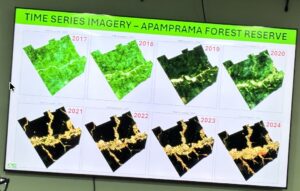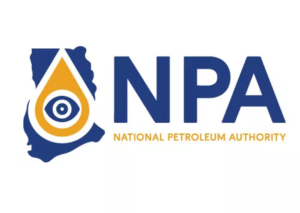
Photo: Yakubu Abanga and Joseph Yamin
• EOCO told to grill Abanga, Yamin
In a striking break from the inertia that defined illegal mining enforcement under the Akufo-Addo administration, the Government of Ghana has directed the Economic and Organised Crime Office (EOCO) to initiate full-scale investigations into alleged galamsey operations involving senior figures in the governing National Democratic Congress (NDC).
In a letter dated 15 July 2025, the Attorney General and Minister for Justice, Dr Dominic Akurutinga Ayine, tasked EOCO with interrogating Mr Yakubu Abanga and Mr Joseph Yamin over their suspected involvement in unauthorised mining across several mineral-rich zones. The directive also authorises EOCO to extend its probe to “any additional persons” found complicit in these illicit activities.
“These operations… gravely endanger our water bodies, forest reserves, and local livelihoods,” Dr Ayine wrote, calling for swift and decisive action to safeguard “the rule of law and the integrity of Ghana’s extractive governance framework.”
From Silence to Scrutiny
The move is being widely seen as a watershed moment in Ghana’s long and troubled fight against galamsey. Under former President Akufo-Addo, critics say the anti-illegal mining agenda was undermined by political protectionism and selective enforcement. Despite repeated pledges and mounting public frustration, key actors named in media and intelligence reports were rarely brought to book.
A pivotal flashpoint came in 2023, when former Environment Minister Professor Kwabena Frimpong-Boateng released a report alleging the involvement of government officials and party financiers in illegal mining syndicates. The document, though explosive, was quietly shelved. Now, Dr Ayine’s directive appears to breathe new life into that forgotten dossier.
A Message of Zero Tolerance?
Significantly, the Attorney General’s directive calls on EOCO to involve the Chief Executive Officer of the Minerals Commission, a regulatory agency long accused of turning a blind eye to illicit operations and flawed licensing processes.
Anti-corruption groups have cautiously welcomed the move.
“This is the kind of institutional courage we’ve been waiting for,” said Benjamin Nsiah of the Centre for Environmental Management and Sustainable Energy. “It signals a break from partisan shielding and suggests the law may finally be applied without fear or favour.”
Yet seasoned observers remain sceptical.
“We’ve seen high-profile directives before, often followed by silence,” said Eric Budu, a mining governance analyst. “The question now is whether EOCO will prosecute or merely perform a public ritual.”
Yamin Roars Back with a Metaphor
While EOCO prepares to act, one of the key figures named — Joseph Yamin, the NDC’s National Organiser — has issued a cryptic and metaphor-laced response. In a post widely circulated online, Yamin recounted a childhood memory of being accused of stealing a soldier’s cat.
“He said, ‘Joe, so you people wanted to add my cat to what you’re preparing?’ We denied it, but he added: ‘I saw these dogs around you chasing my cat… Tomorrow, everybody go hear of it.’ And by the next morning, everyone had heard,” Yamin recalled.
Ending his post with a warning, he added:
“When you see a lion sleeping, don’t wake it — you may not like its reaction… Tomorrow, everyone will hear of us.”
His comments, laced with allegory and veiled threats, suggest the NDC strongman views the allegations as politically orchestrated — and is gearing up for a robust public rebuttal.
Meanwhile, Yakubu Abanga, the party’s Third National Vice Chairman, has also dismissed the allegations as “baseless and politically motivated.”
A Test for the System
Whether this marks the beginning of a new era of institutional accountability or simply another episode of political theatre remains to be seen. But with both individuals wielding significant grassroots clout, the stakes are high — not just for EOCO, but for the credibility of a government promising to do things differently.
Should the investigation result in prosecutions, it could signal a long-awaited turning point in Ghana’s fight against corruption and environmental degradation. If not, it may serve only to reinforce public cynicism and deepen distrust in the machinery of justice.






